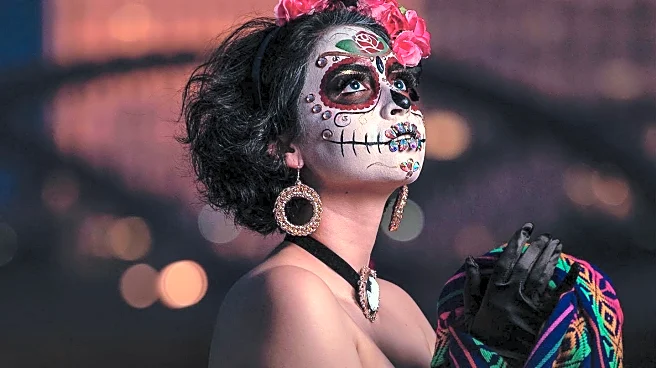What is the story about?
What's Happening?
The beauty industry is under scrutiny for its perceived lack of representation and recognition of Latine contributions during Hispanic Heritage Month. Despite Latinas being significant consumers in the beauty market, with a buying power of $2.4 trillion, the industry appears hesitant to fully embrace and celebrate Latine culture. This year, the usual fanfare of special collections and campaigns seems muted compared to previous years. For instance, Sephora's efforts have been less visible, with limited mentions on their primary social media platforms. This has led to feelings of exclusion among Latine consumers, who see their cultural aesthetics being appropriated without due credit. The struggle for visibility is further highlighted by Latine brand founders facing challenges in securing financial support for their initiatives, even during their dedicated month.
Why It's Important?
The lack of representation and recognition in the beauty industry during Hispanic Heritage Month has broader implications for cultural inclusivity and economic equity. Latinas, as major consumers, contribute significantly to the industry's revenue, yet their cultural contributions are often overlooked or appropriated. This disconnect can lead to a loss of trust and engagement from Latine consumers, potentially affecting sales and brand loyalty. Moreover, the struggle of Latine brand founders to secure sponsorships highlights systemic barriers in the industry that can stifle innovation and diversity. Addressing these issues is crucial for fostering a more inclusive and equitable market that respects and celebrates cultural diversity.
What's Next?
The beauty industry may face increased pressure to improve its representation and support for Latine communities. Brands might need to reassess their marketing strategies and engagement efforts to better align with the cultural values and contributions of Latine consumers. This could involve more visible campaigns, collaborations with Latine influencers, and investment in Latine-owned brands. Additionally, there may be calls for greater transparency and accountability in how brands support cultural initiatives. As consumers become more aware of these disparities, companies that fail to adapt may risk losing market share to those that prioritize inclusivity and representation.
Beyond the Headlines
The ongoing issue of cultural appropriation in the beauty industry raises ethical questions about the recognition and respect for cultural heritage. The appropriation of Latine aesthetics without acknowledgment can perpetuate stereotypes and undermine the cultural significance of these styles. This highlights the need for a broader conversation about cultural sensitivity and the ethical responsibilities of brands in promoting diversity. Long-term, this could lead to shifts in industry standards and practices, encouraging more authentic and respectful representation of diverse cultures.

















